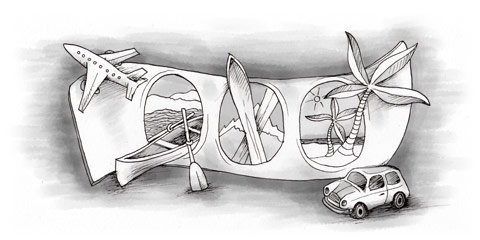1. Stop immediately. Switch on your hazard warning lights and place a warning triangle at the edge of the road 30m (100ft) behind your car, ensuring that it can be seen from at least 100m (325ft).
2. If anyone is injured, immediately call the fire service ( sapeurs-pompiers) by dialling 18. Emergency phones (orange pillars with SOS written on them) are positioned at 2km (1.2mi) intervals on motorways and every 4km (2.5mi) on other roads. To use them press and release the button marked pour demander au secours (‘to summon help’) and speak into the metal grille. Give the number of the telephone and as many other details as possible. The mobile (cellular) phone emergency number is 112. If you take an injured person to hospital yourself and he dies in your car, you could be sued for a great deal of money! If there are no injuries and if damage to vehicles or property isn’t serious, it’s unnecessary to call the police, unless another driver has obviously been drinking or appears incapable of driving. You must never leave the scene of an accident, however minor, before completing this procedure, as this is a serious offence.
3. If either you or the other driver(s) involved decides to call the police, don’t move your vehicle or allow other vehicles to be moved unless this is necessary to unblock the road.
4. In the case of an accident involving two or more vehicles, it’s standard practice for drivers to complete an accident report form ( constat amiable) provided by insurance companies (keep one in your car). As the name implies, this is an ‘amicable statement’, where drivers agree (more or less) on what happened. It isn’t obligatory to complete a constat, although an insurance claim made out in any other form can take longer to process. If your French isn’t good, you may complete a constat in another language. At the bottom of the form there are a number of statements describing the circumstances of the accident. You should tick the boxes that apply, add up the number of ticks and enter the number in the box at the bottom. This prevents the form from being altered later.
It’s important to check the details included on forms completed by other drivers against official documents, particularly those relating to a driver’s identity, driving licence, car registration and insurance details. Drivers must sign each other’s forms. Always check exactly what the other driver has written before signing. Don’t sign a statement, particularly one written in French, unless you’re certain you understand and agree with every word. In the event of a dispute, a local bailiff ( huissier de justice) should be called to prepare an independent report ( constat d’huissier). If the police attend the scene of an accident, they will also make their own report.
If you witness an accident or its aftermath, it’s a criminal offence not to try to assist anyone in danger, at least by calling for help, and you can be fined up to €75,000 and imprisoned for up to five years for failing to do so.
France has a national fund, the Fonds de Garantie Automobile (FGA, www.fga.fr ) that pays compensation to people injured and vehicles damaged by hit-and-run drivers. However, you can claim for damage to your vehicle only if the person responsible can be identified and is uninsured or insolvent. To make a claim, those in the south-east of France should contact the Marseille office at 39 boulevard Vincent Delpuech, 13255 Marseille Cedex 06 ( 04 91 83 27 27); those in all other parts of France should contact the Paris office at 64 rue de France, 94682 Vincennes Cedex (01 43 98 77 00).
Accident prevention is promoted by Prévention Routière (01 44 15 27 00, www.preventionroutiere.fr ). Other useful contacts are the Fondation Anne-Cellier Contre l’Insécurité Routière (01 45 00 95 35) and the Ligue Contre la Violence Routière (01 45 32 91 00).
This article is an extract from Living and working in France. Click here to get a copy now.


